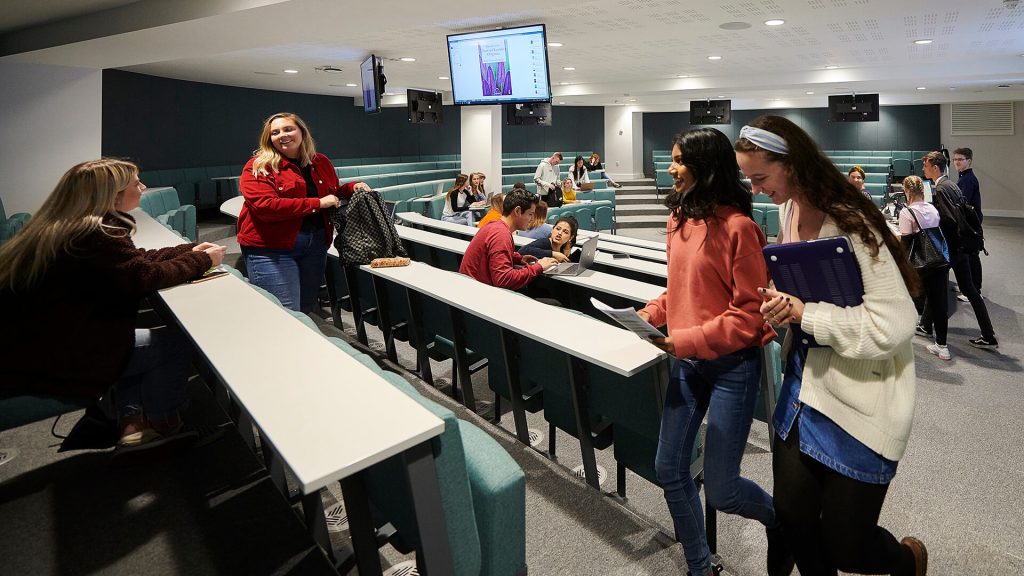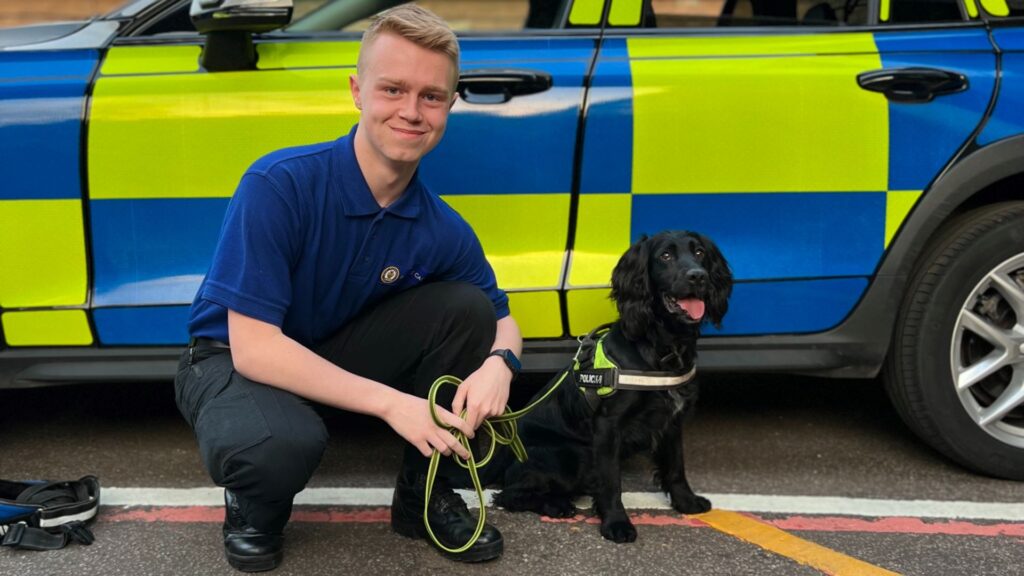Policing and Criminal Justice BSc (Hons)
UCAS code: PP47
Examine issues that influence criminal activity. Explore how criminal justice agencies manage offenders and safeguard society. Develop practical skills to prepare you for a future career in the criminal justice system, on our BSc (Hons) Policing and Criminal Justice degree.
Overview
| Course length: | 3 years full-time |
|---|---|
| Start dates: | September 2026 |
| Location: | Edge Hill University |
| Example offers: | BBC- BBB (A-Level) or DMM (BTEC) |
| Subject(s): | Policing and Criminal Justice |
| Faculty: | Arts and Sciences |
| Department: | Law and Criminal Justice |

Are you interested in law enforcement? Is it your ambition to work within the criminal justice system? Wherever your interests in these areas lie, our BSc (Hons) Policing and Criminal Justice degree has been designed to equip you with the vital knowledge, understanding and skills to prepare you for a future career in these fields.
Preventing and reducing crime is not the responsibility of one person, but many. The ongoing work of core agencies in the criminal justice system is essential to managing crime, assessing risk and safeguarding potential victims. You could be part of that.
We pride ourselves on providing not only an excellent academic experience but also a supportive environment where you can thrive. Gaining a thorough grounding in the legislation, policies and mechanisms that are designed to manage offenders and protect the public, you’ll benefit from a curriculum influenced by highly-qualified and experienced professionals in policing and related agencies. Optional modules will enable you to tailor your learning journey to your specific interests and career aspirations.
Our programme also offers a range of additional opportunities to support your interests in different career pathways. As well as access to a broad range of extra-curricular activities, we’ll provide you with the opportunity to apply your learning and develop your employability skills through approved work placements.
Whichever direction your studies take you, you’ll graduate with a firm footing in the world of policing and criminal justice and the knowledge, skills and professional attributes that employers value.
Course features
-
Studying abroad option available
-
Sandwich year option available
-
Work placement opportunity
What you'll study
Year 1 of BSc (Hons) Policing and Criminal Justice is designed to provide you with an introductory insight into the criminal justice system, cyber security and public protection policing including the legislation, theories and principles that underpin them. From modules exploring mental health and offending to those that examine the principles of cyber security or how the criminal justice system supports the most vulnerable victims of crime, we’ll equip you with key knowledge and the skills needed for successful study and potential progression into a career in policing, law enforcement or criminal justice. You’ll also have the opportunity to select modules to suit your interests and career aspirations including those that explore how core agencies of criminal justice interact or examine the relationship between addiction and offending.
In Year 2, you will increase your knowledge and understanding of criminal justice, with a particular focus on substantive criminal law in England and Wales. Through a range of compulsory modules, you’ll examine violence and its varying forms and build on your existing knowledge of public protection policing through exploration of issues including hate crime. Optional modules provide the opportunity to examine cyber crime, the rehabilitation and treatment of offenders and the role and function of probation services within criminal justice, in more detail. We’ll also provide you with the opportunity to apply your knowledge and skills in practical-focused modules. This will equip you with the tools to conduct criminal justice research as well as developing your employability skills through a work placement.
In Year 3, you’ll draw on your work placement experiences to carry out a substantial piece of self-directed legal research, developing your confidence and competence in this field. You’ll also get the opportunity to deepen your knowledge and understanding of the advanced topic of Counter Terrorism and further develop the knowledge and skills needed to solve real-world cyber security problems. Module options will provide further tuition on advanced topics including the Politics of Policing, Law of Evidence, Digital Policing and Information and Intelligence.
How you'll study
You will be taught by a mixture of lectures, seminars and workshops.
Joining our Policing and Criminal Justice programme means you’re embarking on an immersive learning experience, with opportunities to to develop your practical skills in our on-campus Moot Court Room and Police Training and Simulation Centre (‘Crime House’).
All students will also receive support in developing their academic legal skills, as well as transferable skills, through our Legal Skills sessions, Uniskills workshops and Careers Team events.
How you'll be assessed
Our BSc (Hons) Policing and Criminal Justice degree takes account of both the need to develop and demonstrate academic skills and learning, and to demonstrate learning relevant to careers in policing, law enforcement, the wider criminal justice system, and graduate jobs market.
Throughout your degree, assessment methods will include: report writing, essay writing, practice-based work, reflections, problem-based scenarios, posters, presentations, and some examinations.
You will receive assessment support in each module and will have access to additional support via Uniskills. You will also receive timely feedback throughout the module and after each assessment.
Who will be teaching you
You will be taught by our highly qualified and experienced team composed of former Chief Superintendents, Detective Chief Superintendents, Directors of Intelligence, Criminal Intelligence Analysts and Cyber Crime specialists, as well as internationally recognised academics. Staff have practical and research experience across a number of relevant fields including youth justice, cybersecurity, managing offending behaviour, homicide investigations, decision-making in policing, policing protests, intelligence and data analysis, international data sharing, multi-agency working, policing large-scale events, and violence.
Where your course includes optional modules, these are to provide an element of choice within the course curriculum. The availability of optional modules may vary from year to year and will be subject to minimum student numbers being achieved. This means that the availability of specific optional modules cannot be guaranteed. Optional module selection may also be affected by timetabling requirements. Some restrictions on optional module choice or combinations of optional modules may apply.
Entry criteria
Typical offer 112-120 UCAS Tariff Points. No specific subjects required.
GCSEs in Mathematics and English at Grade C or Grade 4 or above (or equivalent) are also required.
Example offers
| Qualification | Requirement |
|---|---|
| A Level | BBC-BBB. |
| UCAS Tariff points | 112-120 points. |
| BTEC Extended Diploma (or combination of BTEC QCF qualifications) | Distinction, Merit, Merit (DMM). |
| T Level | Overall grade of Merit. |
| International Baccalaureate (IB) | We are happy to accept IB qualifications which achieve the required number of UCAS Tariff points. |
| Access to Higher Education Diploma | 45 credits at Level 3, for example 15 credits at Distinction and 30 credits at Merit or 24 credits at Distinction and 21 credits at Merit. The required total can be attained from various credit combinations. |
Please note, the above examples may differ from actual offers made. A combination of A Level and BTEC awards may also be accepted.
If you have a minimum of two A Levels (or equivalent), there is no maximum number of qualifications that we will accept UCAS points from. This includes additional qualifications such as Extended Project Qualification (EPQ), AS Levels that haven't been continued to A Level, and General Studies AS or A Level awards.
English language requirements
International students require IELTS 6.0, with a score no lower than 5.5 in each individual component, or an equivalent English language qualification.
If your current level of English is half a band, one band, or one-and-a-half bands lower, either overall or in one or two elements, you may want to consider our Pre-Sessional English course.
Fair Entry Criteria
Our new Fair Entry Criteria is a Contextual Admissions Policy that takes an applicant’s personal and educational background into account. This policy will allow eligible applicants to receive up to a two-grade reduction in their entry requirements for this course. Find out more and see if you qualify.
How to apply
Apply full-time
Read our guide to applying through UCAS to find out more about the application process.
Should you accept an offer of a place to study with us and formally enrol as a student, you will be subject to the provisions of the regulations, rules, codes, conditions and policies which apply to our students. These are available at www.edgehill.ac.uk/studentterms.
If you join a full time undergraduate degree at Edge Hill University, we will guarantee you the offer of a room in our halls of residence for the first year of your course.
Discover our accommodation
Facilities
The £6m Law and Psychology building provides contemporary teaching and learning facilities for students in the School of Law and Criminal Justice.
The three-storey building includes a 265-seat lecture theatre, seminar and tutorial rooms, and social learning areas which encourage a more informal and interactive style of learning.
It is also where our moot court room and law clinic are located. Law, Policing and Criminal Justice students can train and practice their advocacy skills and cross-examination techniques as well as preparing for giving evidence in court.
Our Police Training and Simulation Facility know as the ‘Crime House’, part of which is furbished as a police station, is used to simulate a wide range of crime scenes, providing students with an immersive learning experience. The ‘Crime House’ includes a mock custody suite, mock living areas, interview rooms, a control room, and a state-of-the-art simulation suite.
This enables Policing, Criminal Justice and Law students to work together on practical exercises, developed by our expert staff and based on real-life scenarios, in areas such as gathering and analysing evidence, (including forensic evidence at crime scenes), practicing interview techniques and supporting mock clients during a police interview.
Where you'll study
Finance
Tuition fees
Fees for academic year 2026/2027 are yet to be confirmed.
The University may administer a small inflationary rise in tuition fees, in line with Government policy, in subsequent academic years as you progress through the course.
EU/EEA and Swiss students who have settled or pre-settled status under the EU Settlement Scheme, as well as Irish nationals, may be eligible for the UK tuition fee rate.
Financial support
Subject to eligibility, UK students joining this course can apply for a Tuition Fee Loan from the Government to cover the full cost of tuition fees. UK students enrolling on the course may also be eligible to apply for additional funding to help with living costs.
Scholarships
We offer a range of scholarships, which celebrate the determination, commitment and achievement of our students. Many of our scholarships are awarded automatically. There are some however, where you will need to be involved in an application or nomination process. To find out more about our scholarships and check your eligibility, please visit our dedicated scholarships pages.
Money Matters
Please view the relevant Money Matters guide for comprehensive information about the financial support available to eligible UK students.
EU/EEA and Swiss students who have settled or pre-settled status under the EU Settlement Scheme may be eligible to apply for financial support. Irish nationals can ordinarily apply to Student Universal Support Ireland (SUSI). If you are an EU student who does not have settled or pre-settled status, or are an international student from a non-EU country, please see our international student finance pages.
Your future career
Whether you are planning a career in the criminal justice system, policing or a career in another field of expertise, our BSc (Hons) Policing and Criminal Justice programme will develop your transferable skills and inspire you to reach your career goals.
Recent Edge Hill Policing and Criminal Justice students have gone on to have a wide variety of successful careers including: police officers in Forces across England and Wales; positions with the British Transport Police and the Civil Nuclear Constabulary; Policing and Law Enforcement Analysts; roles in Public Protection and Child and Youth Services and criminal and youth justice charities; for HM Prisons and Probation Service; and graduate training schemes.
As a School, we are committed to enhancing your employability and helping you to find the right career path for you. Professional development opportunities are embedded into your programme or offered through extra-curricular activities, such as:
- Practice-focused modules – develop your practical skills through our practice focused modules and state-of-the art Police Training and Simulation Facility (‘Crime House’), learning how to conduct interviews and investigate crime scenes.
- Work placement opportunities – whether taken as part of our work placement modules or as an extra-curricular activity, there are numerous opportunities to undertake work experience.
- Careers fairs, alumni panels, site visits – benefit from our extensive networks with the Probation Service, Home Office and Police Forces in England and Wales, grow your network and build connections with our specialist School Careers Fair and Alumni Panel events.
Course changes
Every effort has been made to ensure the accuracy of this information, however our courses are subject to ongoing review and development. Changing circumstances may necessitate alteration to, or the cancellation of, courses.
Changes may be necessary to comply with the requirements of professional bodies, revisions to subject benchmarks statements, to keep courses updated and contemporary, or as a result of student feedback. We reserve the right to make variations if we consider such action to be necessary or in the best interests of students.












